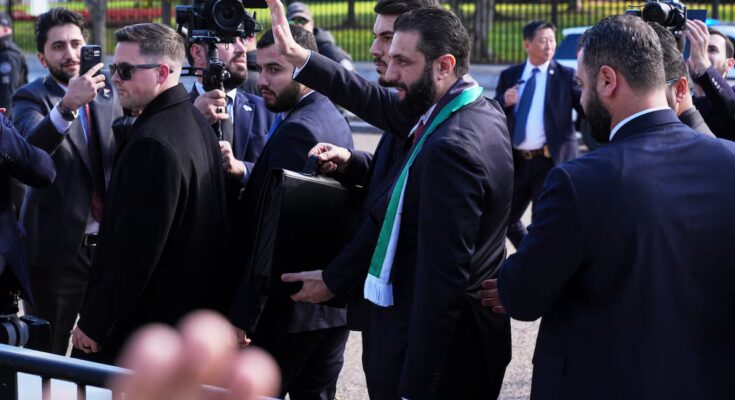Less than a year ago, then-US President-elect Donald Trump publicly distanced himself from events in Syria following the fall of dictator Bashar al-Assad. “Let them work it out, let’s not get carried away,” he asked. This recommendation has aged poorly: Washington is collaborating with Damascus in the transition process, and the Republican received that country’s new leader, Ahmed al Shara, at the White House on Monday. It is the first visit of a head of state from the Arab country to Washington, and also the first time that the US administration hosts a former jihadist leader for whose head it has offered up to ten million dollars (nine million euros).
The meeting, which had security as its main theme, took place almost in secret. It appeared on Trump’s official agenda, but did not follow the usual protocol for visits by foreign leaders. Instead of entering the front door in the West Wing of the White House, Al Shara entered through a side usually reserved for officials. There was no honor escort with flags at the entrance nor photographs of the meeting of the two leaders.
The meeting took place behind strictly closed doors, without the usual exchange of questions and answers with the press between Trump and a foreign leader at the presidential residence. Only the White House confirmed, when the meeting was already underway, that Al Shara had arrived at 11:37 local time (5:37 pm Spanish peninsula time).
Last week, Washington had already withdrawn the sanctions imposed on the former jihadist leader and his Foreign Minister, Anás Khatab, for their role as leaders in the Hayat Tahrir al Sham militia and for their links with the Islamic Army and Al Qaeda. The UN Security Council had also eliminated those it supported against Syria. And while Trump and Al Shara met at the White House in a two-hour meeting, the Treasury Department announced a 180-day suspension of some of its toughest sanctions against Syria, those imposed by the so-called “Caesar law.”
For the United States it is essential to establish good relations with Syria, a key country for connecting the Mediterranean with Asia Minor; also to ensure Israel’s security, avoid the influence of Iran and Russia in the Arab country and prevent the resurgence of the Islamic State or other related groups in the area.
For the Damascus regime, formed in January after the lightning offensive that overthrew Assad led by Hayat Tahrir al Sham – the rebel group led by Al Shara and, until 2016, affiliated with Al Qaeda -, it is essential that Syria reconnects with the rest of the world, obtains international legitimacy, receives aid for a reconstruction which will require over 200 billion dollars (about 170 billion euros), according to the World Bank, and can develop on an economic and diplomatic level. ties with Western powers.
The United States mediates talks on a possible security pact between Syria and Israel. Furthermore, according to the Reuters agency, Washington plans to establish a military presence at an air base in Damascus. The talks between Al Shara and Trump were also expected to address the possibility of Syria joining the US-led global coalition to fight the Islamic State. Syrian forces have already coordinated on several occasions with those of the Coalition, which still operates against ISIS cells in the region.
At the same time as Al Shara landed in Washington this weekend, the Syrian Interior Ministry launched a campaign against cells of the jihadist organization across the country and arrested more than 70 suspects.
The meeting at the White House continues the first contact between the presidents of Syria and the United States which took place in Saudi Arabia last May. In that meeting, facilitated by Saudi Crown Prince Mohamed Bin Salman, Trump praised his interlocutor as a leader with a “strong past”.
Then, Trump expressed to Al Shara his interest in Syria joining the Abraham Accords, through which several Muslim-majority countries begin the process of normalizing relations with Israel. It’s a perspective that may have also been presented during Monday’s meeting at the White House.
The Abraham Accords represent the foreign policy achievement of his first term that Trump is very proud of and is eager to expand. Last week, Kazakhstan, Central Asia’s largest country, joined in a largely symbolic step: Astana already has diplomatic and economic relations with Israel.
Bin Salman will visit the White House next week. Washington has a special interest in adding Saudi Arabia, the spiritual leader of the Arab countries and economic power of the Middle East, to these agreements, even if Riyadh does not prioritize taking measures in that direction until the future of Gaza is resolved and a credible path towards the creation of a Palestinian state is established.
Syria has also shown no sign of much interest in normalizing relations with a neighbor that has occupied part of its southern territory in the Golan Heights – where the current Syrian president’s family is from – since the 1967 Six-Day War, and which has recently invaded more Syrian territory for reasons of protecting its own national security.



